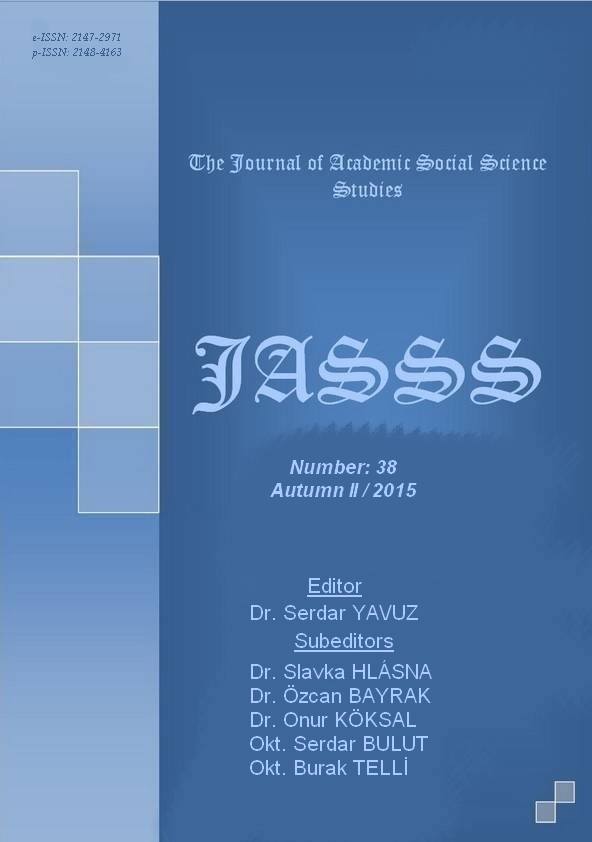Author :
Abstract
Dil felsefesi dilin özünü, anlamını, kökenini, felsefi açıdan sorgular. Bu sorgulamayı yapabilmek için belli bir alt yapıya sahip olmak, bu alanda belli bir eğitimden geçmek gerekmektedir. Filoloji bölümlerinin yanında Türk Dili ve Edebiyatı Bölümleri ile Türkçe Öğretmenliği bölümleri bu eğitimin alt yapısının oluşturulabileceği bölümler arasındadır. Çalışmada Türkçe öğretmenlerinin görüşleri çerçevesinde ülkemizdeki dil felsefesi eğitimi incelenmiştir. Çalışmanın amacı Türk dilinin inceliklerini, etimolojisini kavramış olması beklenen Türkçe öğretmeni adaylarının dil felsefesi eğitimine dair görüşlerini belirlemektir. Araştırma nitel bir çalışmadır. Veri toplama aracı olarak yarı-yapılandırılmış görüşme formu kullanılmıştır. Yarı yapılandırılmış görüşme formunun güvenilirliğinin hesaplanmasında Miles ve Huberman tarafından ortaya konulan güvenirlik formülü kullanılmıştır. Araştırmanın örneklemi 2014-2015 eğitim-öğretim yılının güz döneminde Yıldız Teknik Üniversitesi Eğitim Fakültesi Türkçe Öğretmenliği Ana Bilim Dalı 2 ve 3. sınıflarda öğrenim gören 20 öğretmen adayından oluşmaktadır. Elde edilen verilerin analizinde betimsel analiz tekniği kullanılmıştır. Genel olarak öğretmen adaylarının dil eğitimine ve dil derslerine sıcak baktıkları görülmüştür. Bazı hususlarda yetersizlikler olduğunu dile getiren öğrenciler, özellikle eğitim sisteminin ve müfredatın yetersizliği ile üniversite hocalarının yaklaşımlarının öğretmen adaylarını olumsuz etkilediğini belirtmişlerdir. Lisans programında öğrencilere eleştirel düşünme becerisi kazandıracak olan felsefeye yönelik ve dilin geçmişi, yapısı, etimolojisine yönelik bir ders bulunmadığı tespit edilmiştir. Bunun bir eksiklik olduğu, Türkçe öğretmenlerinin bu konularda donanımlı olarak mezun olmaları gerektiği düşünülmektedir
Keywords
Abstract
Philosophy of Langruage questions the essence, meaning, origin of language philosophically. To be able to do this questioning, it is necessary to have a certain infrastructure and to receive a specific training in this area. Besides the Philology Department, Turkish Language and Literature and Turkish Teaching Department are among the departments in which the infrastructure of this training can be created. In this study, philosophy of language education in our country is examined within the frame of the views of prospective Turkish teachers. The aim of the study is to determine the views of prospective Turkish teachers who are expected to have already comprehended the intricacies and etymology of Turkish language in relation to education of philosophy of language. The research is a qualitative study. As the data collection tool, semi-structured interview form was used. In the calculation of the reliability of semi-structured interview form, the reliability formula conducted by Miles and Huberman was used. The sample of the study is comprised of 20 prospective teachers who studied in the classes of 2nd and 3rd at Yıldız Technical University, Faculty of Education Turkish Teaching Department during the fall semester of 2014-2015 academic year. A descriptive analysis technique was used to analyze the obtained data. In general, the prospective teachers are found to lean towards language education and language courses. The students expressed that there were some deficiencies in certain issues and especially inadequacy of education system and curriculum and approaches of college professors had negative influences on them. In the undergraduate program, it is confirmed that there is no lesson in regard to philosophy which will provide students critical thinking skills and the history, structure, and etymology of the language. It is believed that this is a deficiency and Turkish teachers have to graduate as equipped with the right knowledge on these issues





